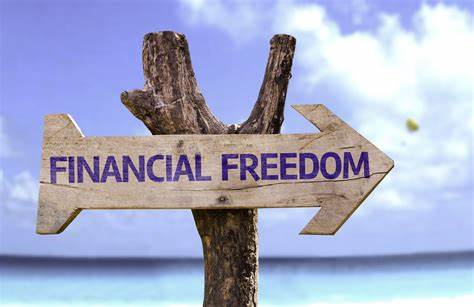Explained : How one can achieve Financial Freedom?
Financial Freedom

For many people, Financial Freedom is still a goal. Financial Freedom usually entails having enough savings, investments, and cash on hand to afford the lifestyle you choose for yourself and your family, as well as a growing nest egg that will allow you to retire or follow the career of your choice without being constrained by a yearly salary. Unfortunately, far too many people do not succeed. With that, They are beset by mounting debt, financial emergencies, wasteful spending, and other obstacles that prevent them from achieving their objectives. Then there are unexpected occurrences, such as a storm or earthquake—or a pandemic—that throw plans into chaos and disclose previously unseen gaps in their safety nets. Almost everyone has problems, but these following habits can help you avoid them -
1. Create Savings Automatically - First and foremost, pay yourself. Enroll in your company's retirement plan and take advantage of any matching contribution opportunities, plan to deposit in a SIP & much more. It's also a good idea to set up automated savings. Ideally, the money should be taken the same day you receive your paycheck, so it never comes into contact with your hands and you are completely free of temptation.
2. Set a Life Goal - To you, what does financial freedom entail? A general desire for it is too broad as a goal, so get it specific. Make a list of how much money you should have in your bank account, the lifestyle you want to live, and when you want to reach it. The more detailed your goals are, the more likely you are to achieve them.
3. Create a budget -The easiest method to ensure that all expenses are paid and savings are on track is to create a monthly household budget and stick to it. It's also a consistent practice that reinforces your goals and strengthens your willpower to resist the need to splurge.
4. Make a complete payment on your credit cards - As discussed in the previous article, Credit cards and other high-interest consumer loans are bad for developing wealth. Make it a habit to pay off your entire balance every month. Student loans, mortgages, and other comparable debts usually have lower interest rates, so repaying them is not a pressing need. Paying on time builds an excellent credit rating and will continue to do so.
5. Continuous Learning - Each year, review any relevant changes in tax regulations to ensure that all adjustments and deductions are maximized. Keep up with financial news and stock market movements, and don't be afraid to make changes to your portfolio as needed. Knowledge is also your best weapon against those looking to make a quick buck by preying on inexperienced investors.
6. Prepare for the uncertainties - Unexpected expenses are one factor that can hinder your goal of financial independence. As a result, being prepared is essential. Two things need to be done for the same & they are -
a) Create a contingency fund: This fund is set up to cover unexpected or urgent needs. Assume you've already set your monthly budget and set aside a certain amount for savings. A contingency reserve of three to six months' worth of spending should be set aside. This assures that in the event of an emergency, you won't have to use your savings. b) Obtain medical coverage: Healthcare expenses are rising, and if you don't have health insurance, a medical emergency might set your goal of becoming financially independent back years (Covid has set a very good example for this).
7. Live Below your means - It's not difficult to live a modest lifestyle if you have the mindset of living life to the fullest with less. Before becoming wealthy, many wealthy people acquired a habit of living below their means. This isn't a challenge to live a minimalist lifestyle to throw out all you've accumulated over the years. Making minor modifications by differentiating between what you need and what you want is a financially beneficial habit to develop.
8. Start Investing Early - Starting early allows you to stay invested for a longer period, and long-term investments have a higher potential for wealth building. The power of compounding could also assist long-term investments. Let us understand the same with an example given below -
(Here the returns are assumed at 12% p.a.)
| Name of the Investor | Ms. P | Ms. R |
| Age | 24 Years | 30 Years |
| SIP Amount | Rs. 5,000 | Rs. 5,000 |
| Total Investments made till age 55 | Rs. 18,60,000 | Rs. 15,00,000 |
| Corpus Value | Rs. 2,00,00,000 | Rs. 94,00,000 |
As shown in the table, since Ms. P started investing early, the difference between the accumulated corpus is huge.
Lastly to sum this up, Managing your finances isn't always simple. As you become older, you may start a family, accept promotions that change your salary, and make other financial decisions. But one can achieve Financial freedom if he/she takes his/her finance decisions wisely.
With that, We wish you all a HAPPY REPUBLIC DAY!
- TEAM IFA